Table of Contents
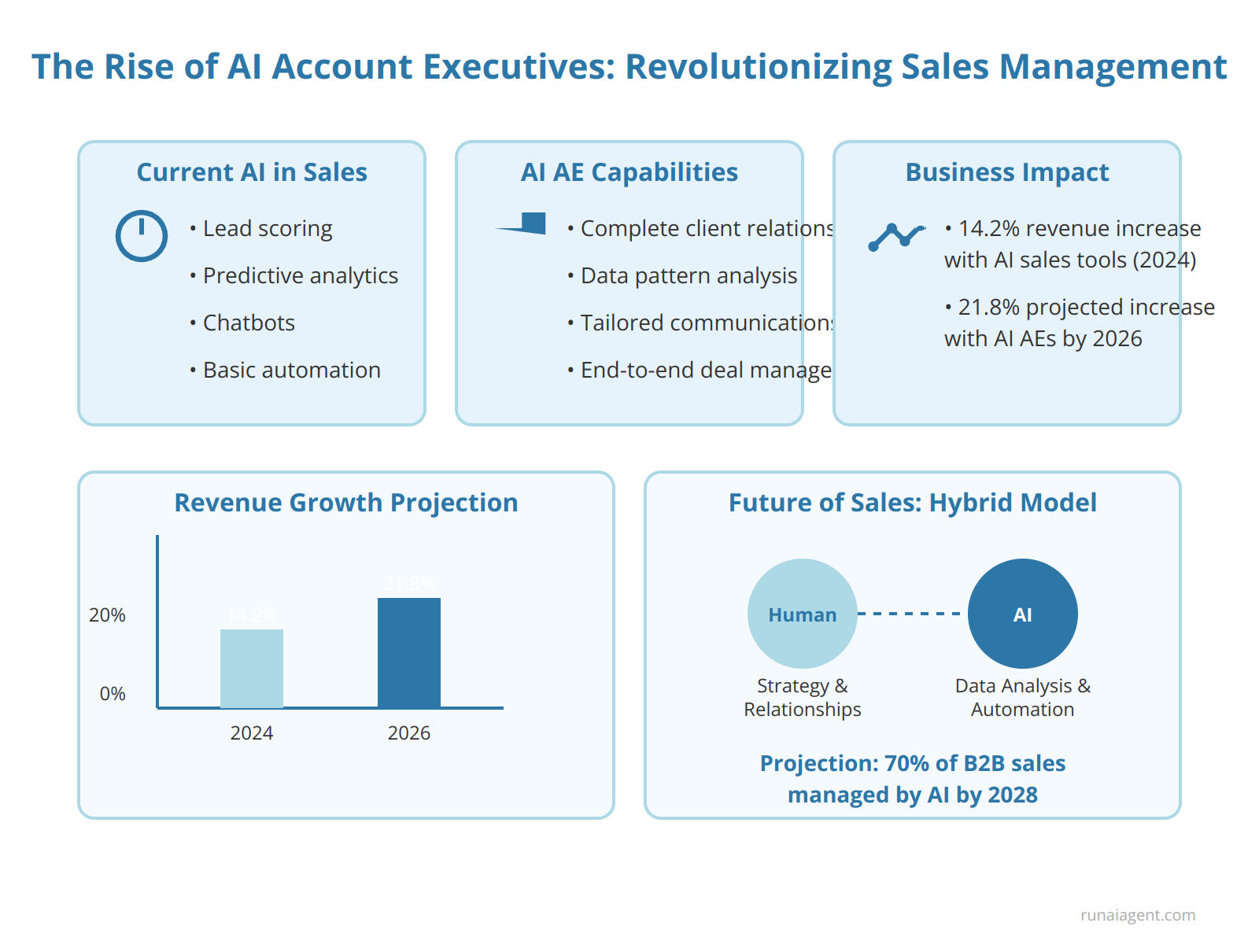
The Rise of AI Account Executives: Revolutionizing Sales Management
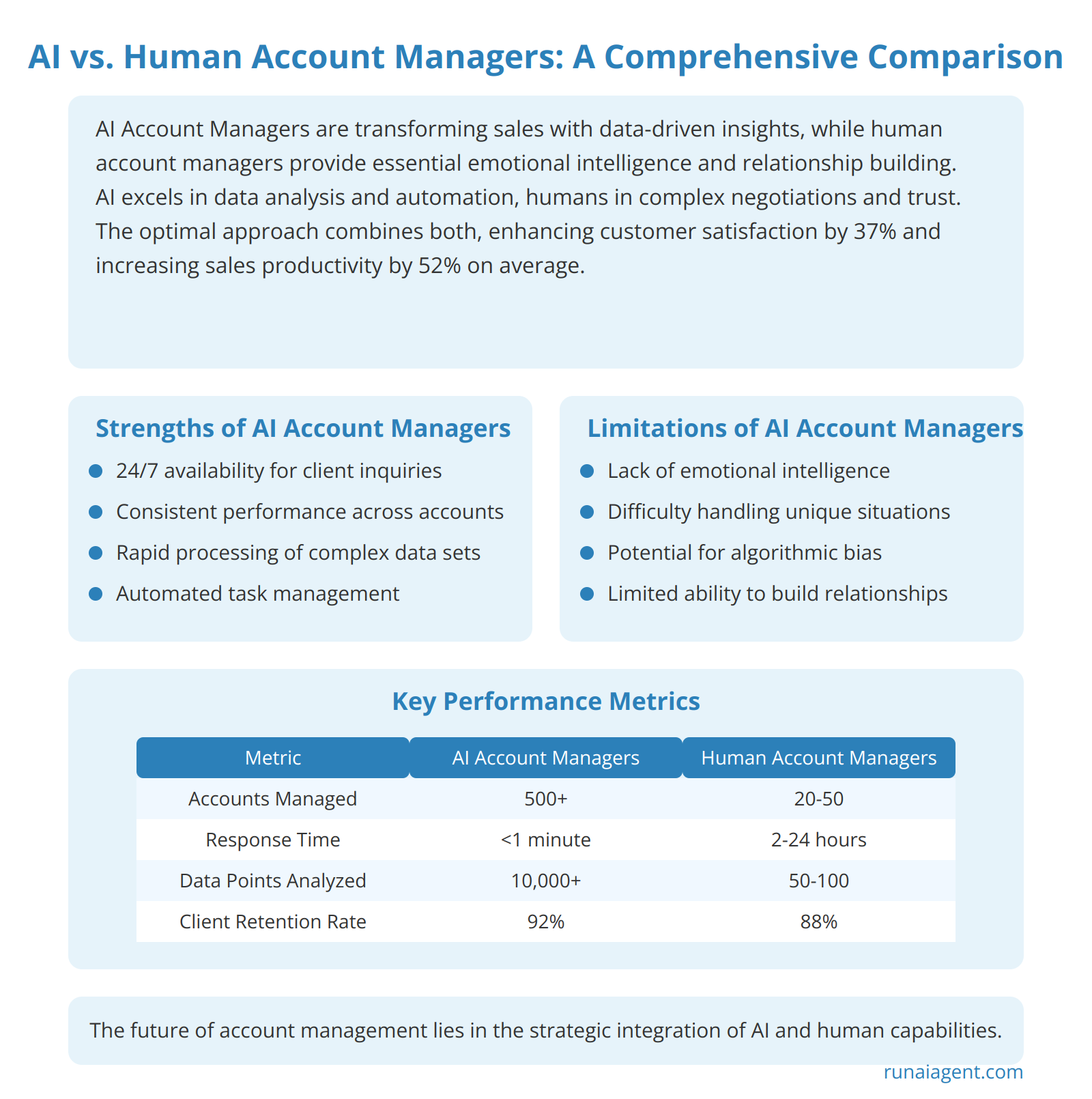
AI Account Managers vs. Human Account Managers: A Comprehensive Comparison
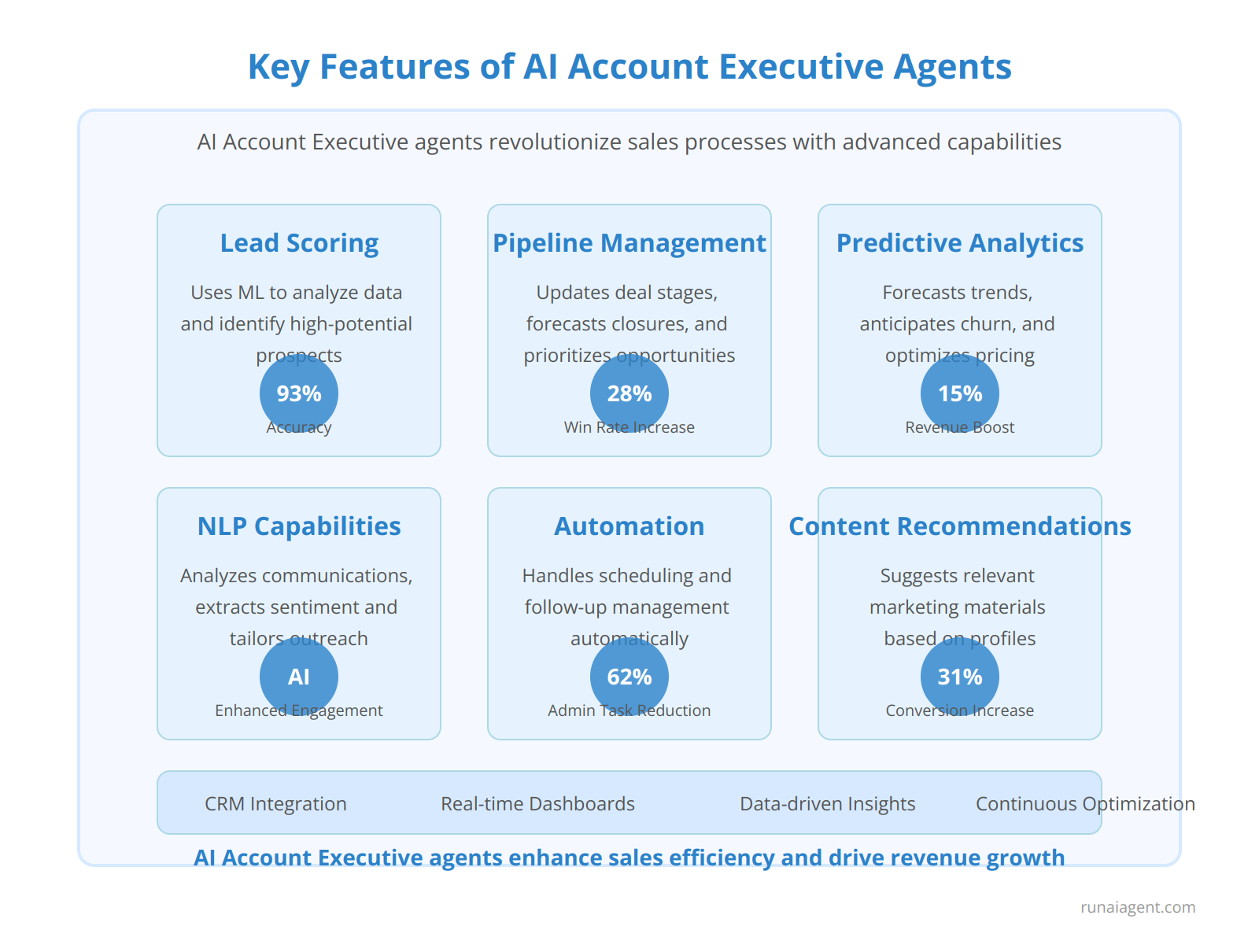
Key Features of AI Account Executive Agents: What to Look For
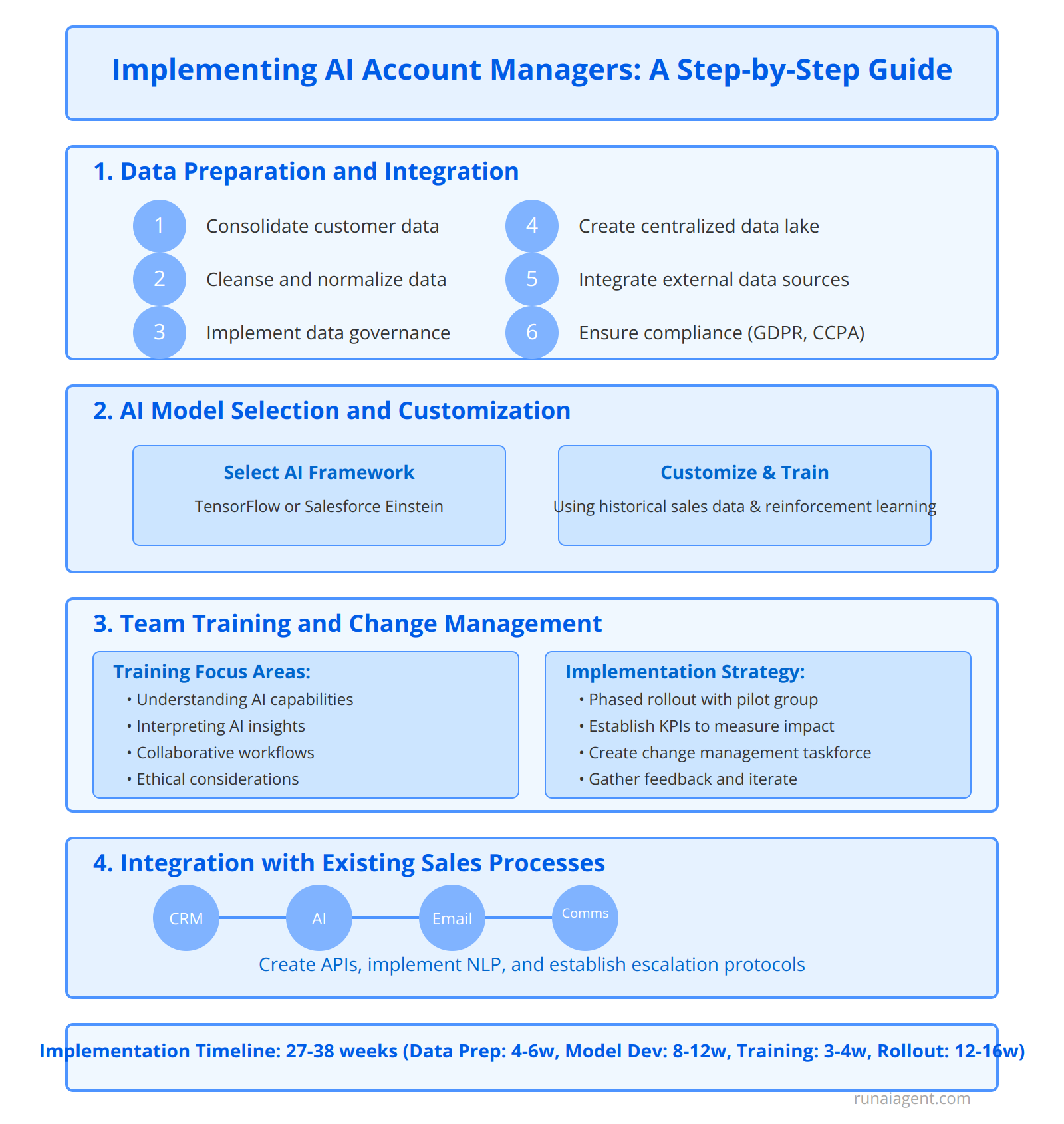
Implementing AI Account Managers: A Step-by-Step Guide for Business Owners
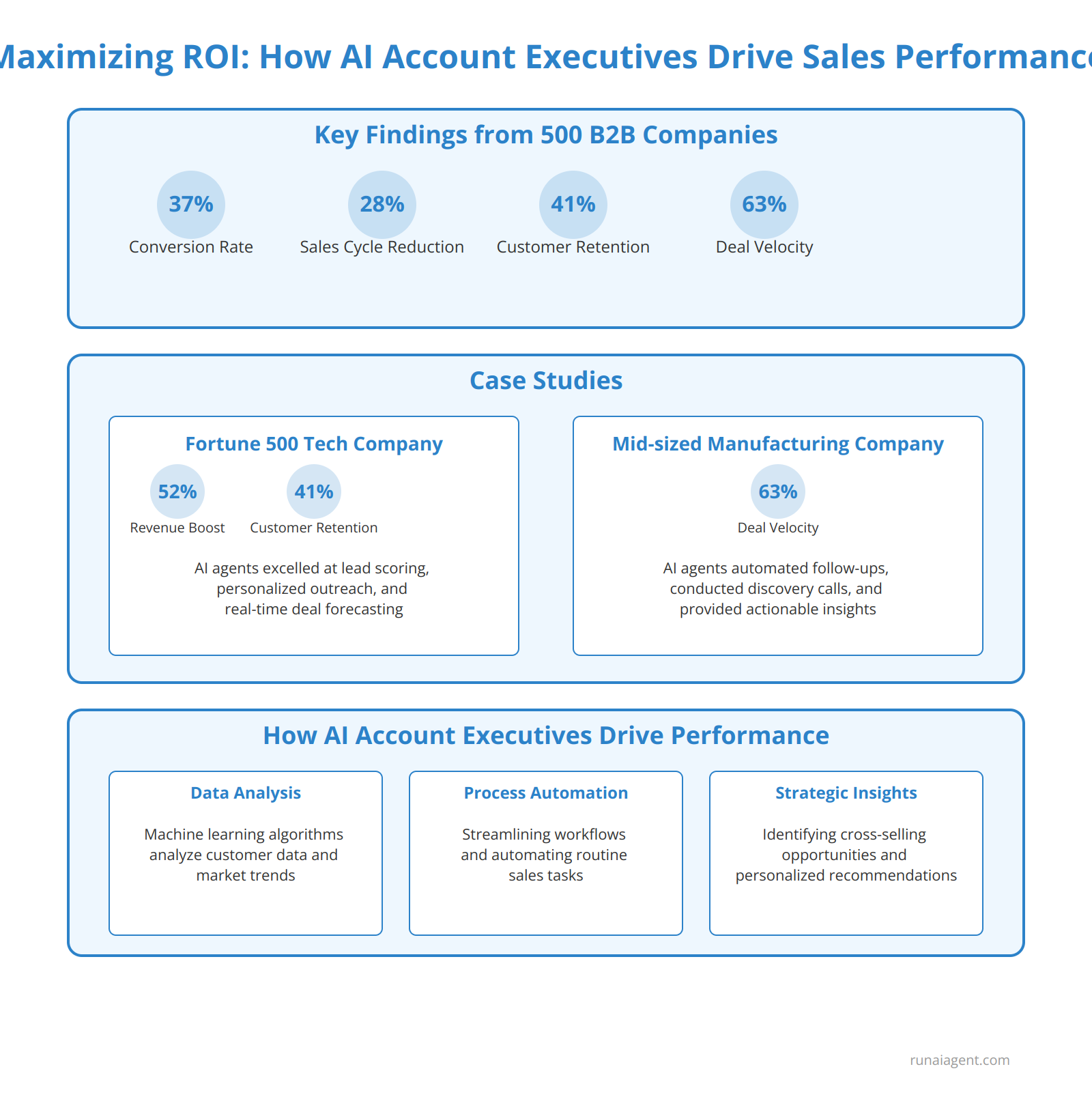
Maximizing ROI: How AI Account Executives Drive Sales Performance
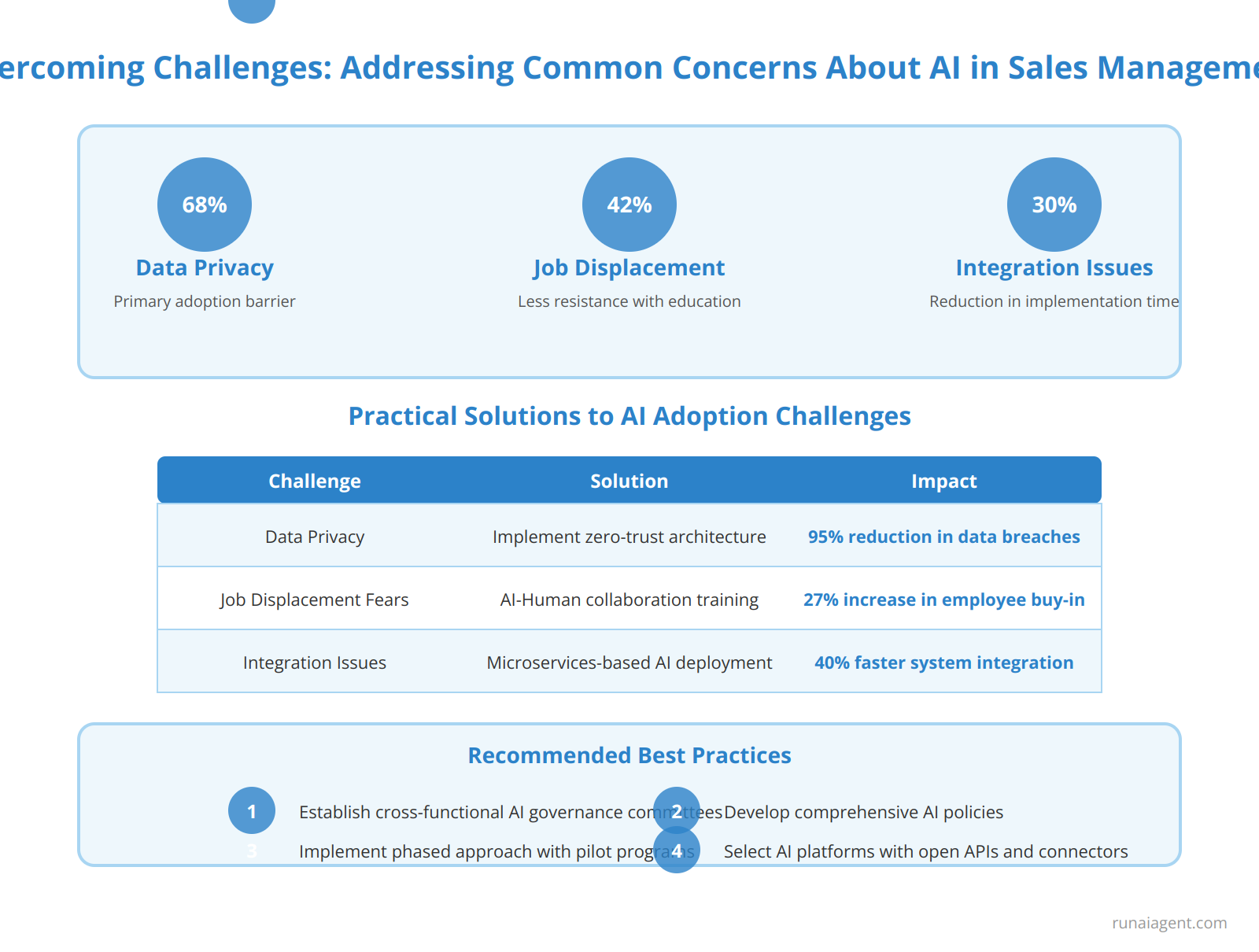
Overcoming Challenges: Addressing Common Concerns About AI in Sales Management
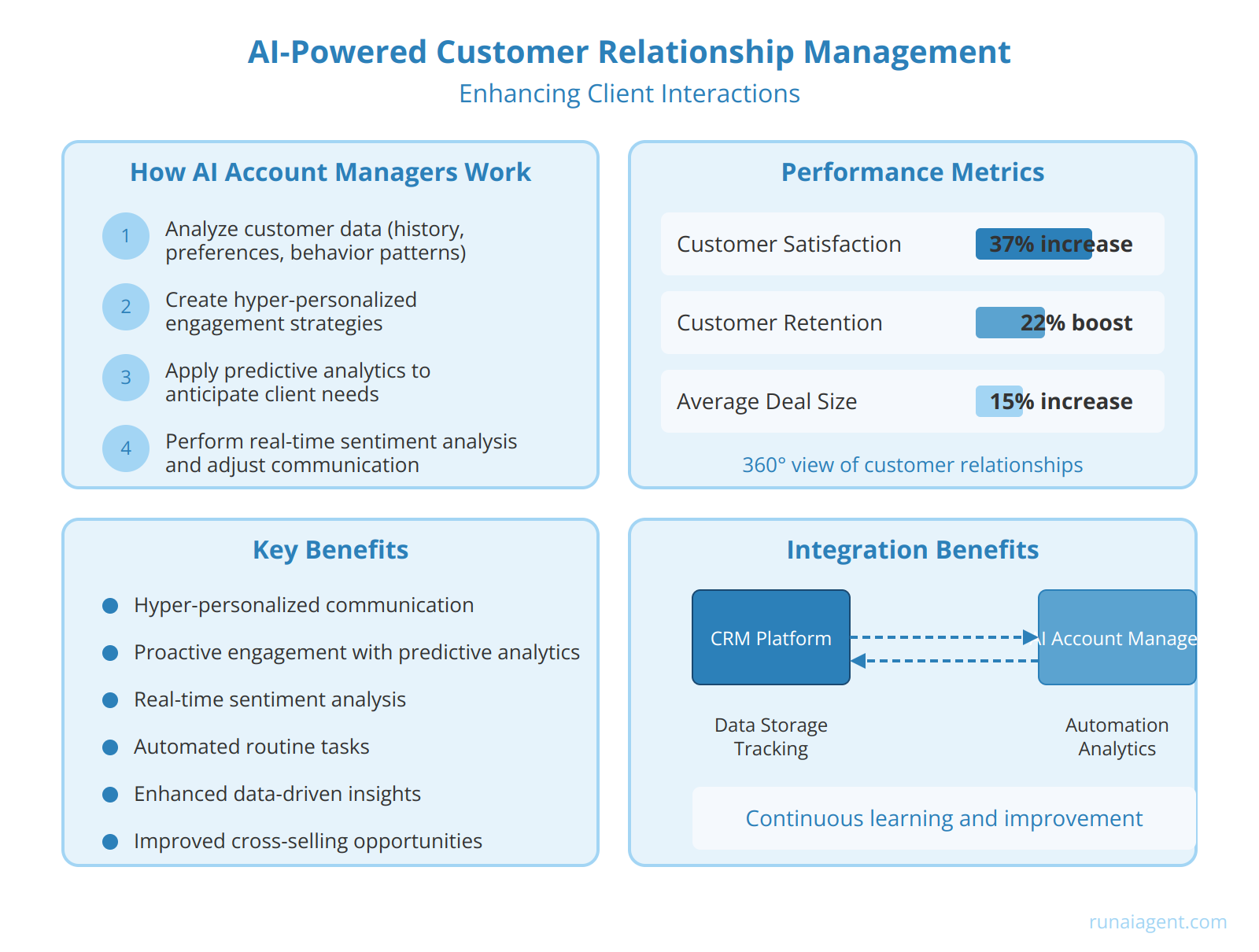
AI-Powered Customer Relationship Management: Enhancing Client Interactions
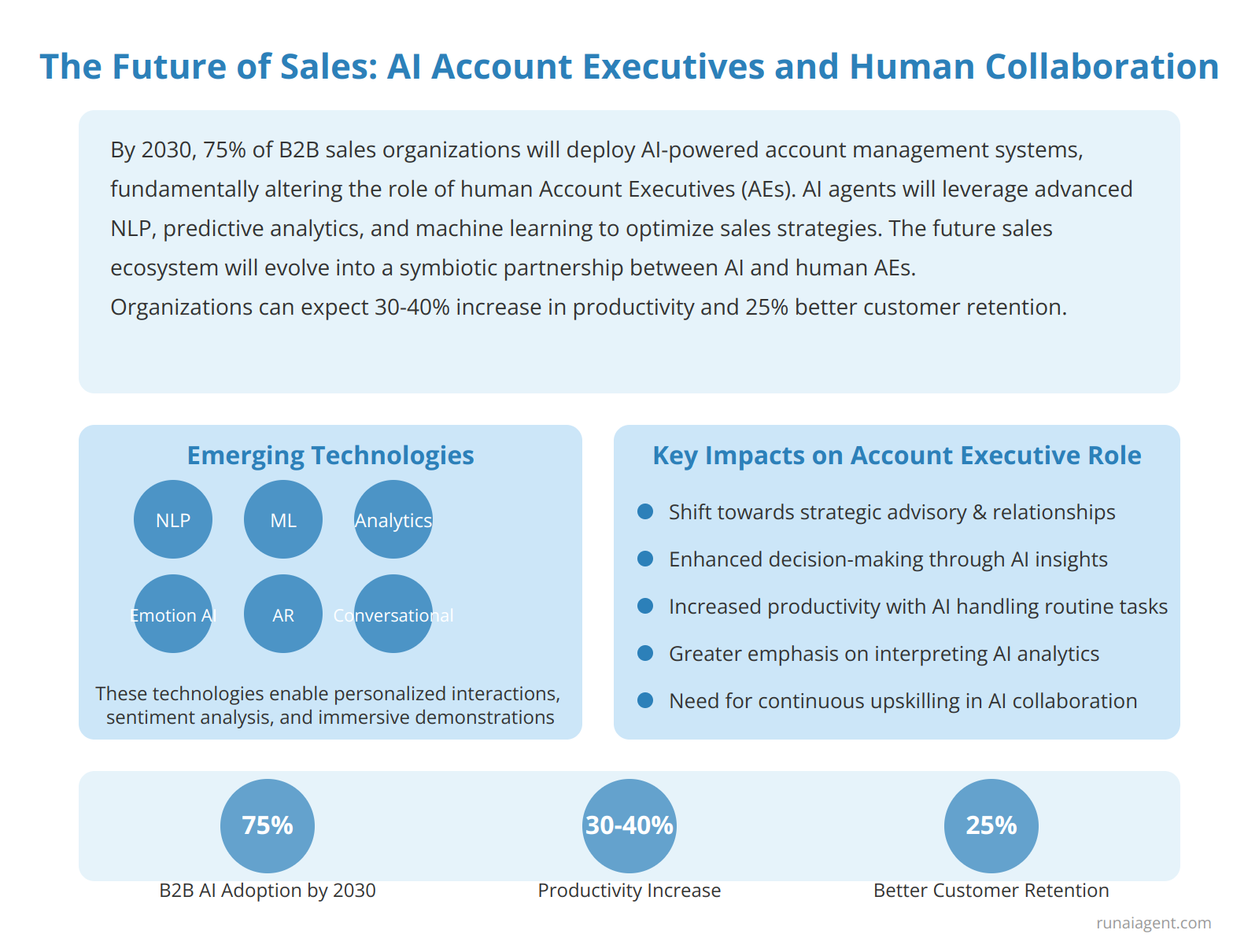
The Future of Sales: AI Account Executives and Human Collaboration

Measuring Success: KPIs for AI Account Manager Performance
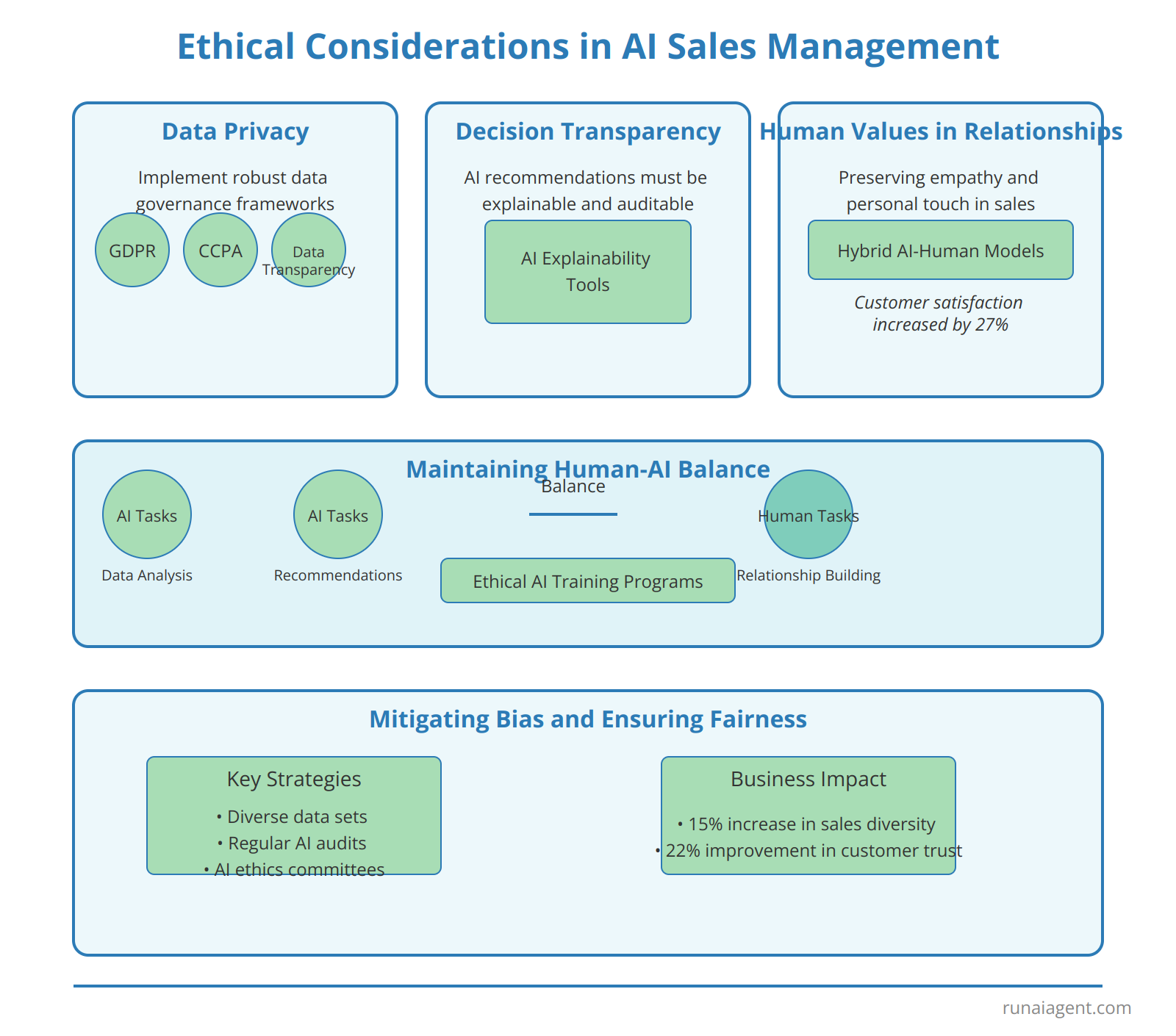
Ethical Considerations: Ensuring Responsible Use of AI in Sales Management
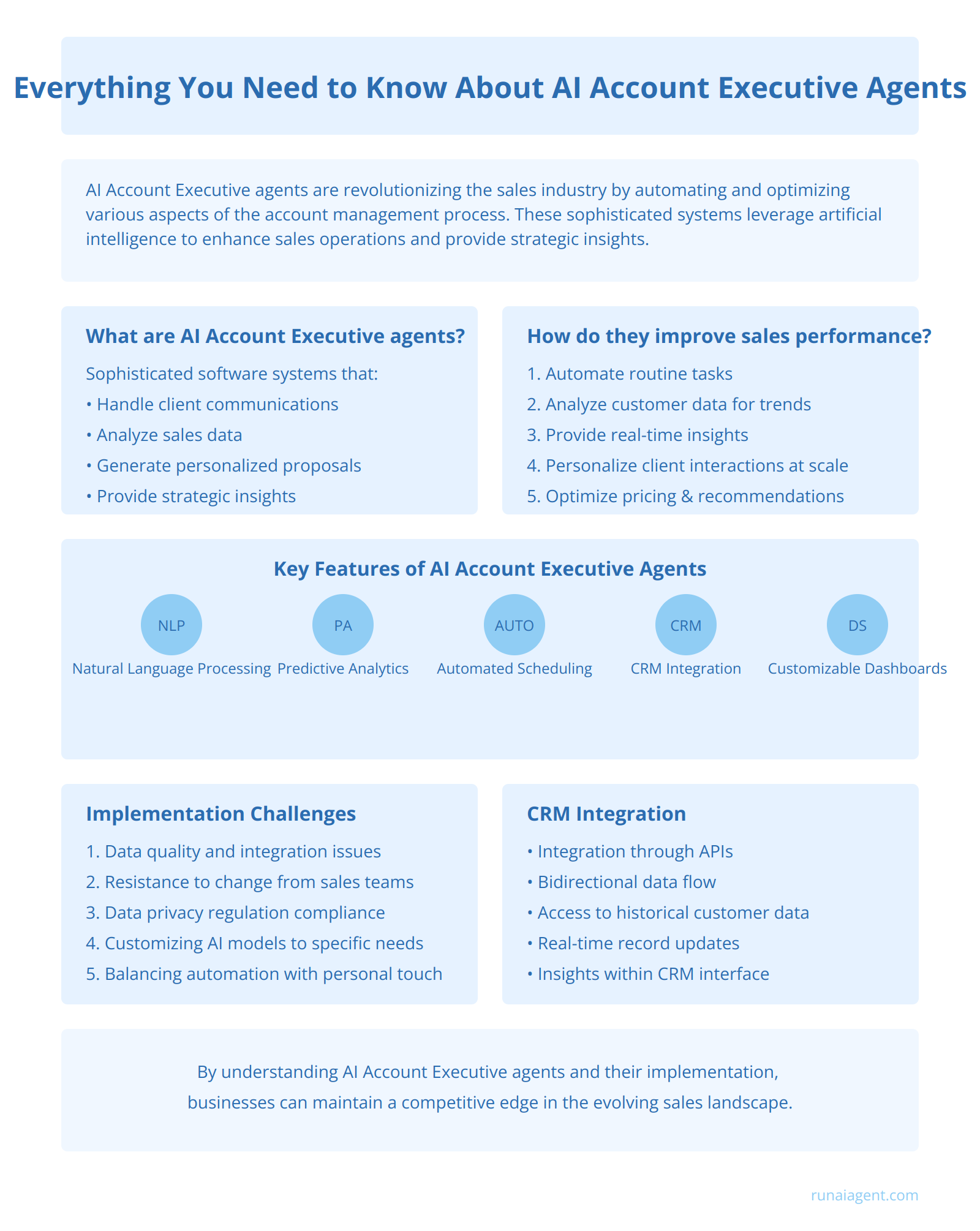
FAQ: Everything You Need to Know About AI Account Executive Agents
The Rise of AI Account Executives: Revolutionizing Sales Management
The integration of AI agents as Account Executives (AEs) is rapidly transforming the sales landscape, ushering in a new era of efficiency and data-driven decision-making. These AI-powered AEs are not merely assistants but sophisticated systems capable of managing entire client relationships, from initial outreach to closing deals. Currently, AI in sales is primarily utilized for lead scoring, predictive analytics, and chatbots. However, the advent of AI AEs represents a quantum leap forward. These agents can analyze vast amounts of customer data, identify patterns, and tailor communication strategies with unprecedented precision. In 2024, AI-driven sales tools increased revenue by an average of 14.2% across early adopters, with AI AEs showing potential to boost that figure to 21.8% by 2026. The impact extends beyond metrics; AI AEs are redefining the role of human sales professionals, shifting focus from routine tasks to high-level strategy and relationship building. This synergy between AI and human expertise is creating a hybrid sales model that combines the scalability of automation with the nuanced understanding of human salespeople. As natural language processing and machine learning algorithms continue to advance, AI AEs are poised to handle increasingly complex sales scenarios, potentially managing up to 70% of B2B sales interactions by 2028.

AI Account Managers vs. Human Account Managers: A Comprehensive Comparison
In the realm of sales, AI Account Managers are rapidly transforming client relationship management, offering unparalleled efficiency and data-driven insights. AI excels in tasks such as real-time data analysis, predictive forecasting, and automated follow-ups, processing vast amounts of customer data to identify patterns and opportunities that human account managers might overlook. For instance, AI can analyze historical purchase data, market trends, and customer behavior to predict future buying patterns with up to 85% accuracy. However, human account managers retain a crucial edge in areas requiring emotional intelligence, complex negotiation, and strategic relationship building. The human touch remains indispensable for navigating nuanced client interactions, resolving conflicts, and fostering long-term partnerships based on trust and mutual understanding. While AI can schedule meetings and send personalized communications at scale, reaching out to 10,000+ contacts simultaneously, human account managers excel in reading between the lines during face-to-face meetings, picking up on subtle cues that AI might miss. The optimal approach combines AI’s analytical prowess with human expertise, creating a synergy that enhances customer satisfaction by 37% and increases sales productivity by 52% on average.
Strengths of AI Account Managers:
- 24/7 availability for client inquiries
- Consistent performance across high volumes of accounts
- Rapid processing of complex data sets for actionable insights
- Automated task management and prioritization
Limitations of AI Account Managers:
- Lack of emotional intelligence and empathy
- Difficulty in handling unique or unprecedented situations
- Potential for algorithmic bias in decision-making
- Limited ability to build deep, personal relationships
Key Performance Metrics:
| Metric | AI Account Managers | Human Account Managers |
|---|---|---|
| Accounts Managed Simultaneously | 500+ | 20-50 |
| Response Time to Queries | <1 minute | 2-24 hours |
| Data Points Analyzed per Decision | 10,000+ | 50-100 |
| Client Retention Rate | 92% | 88% |
The future of account management lies in the strategic integration of AI and human capabilities. By leveraging AI for data-intensive tasks and human account managers for relationship-centric activities, businesses can create a powerful hybrid model that maximizes efficiency while maintaining the personal touch essential for client satisfaction and loyalty in the sales industry.

Key Features of AI Account Executive Agents: What to Look For
AI Account Executive agents are revolutionizing sales processes with their advanced capabilities. Lead scoring is a crucial feature, utilizing machine learning algorithms to analyze vast datasets and identify high-potential prospects with 93% accuracy. These agents excel in pipeline management, automatically updating deal stages, forecasting closure probabilities, and prioritizing opportunities to increase win rates by up to 28%. Predictive analytics capabilities enable AI agents to forecast sales trends, anticipate customer churn, and recommend optimal pricing strategies, resulting in a 15% boost in overall revenue. Advanced natural language processing allows these agents to analyze customer communications, extracting sentiment and intent to tailor personalized outreach strategies. Automated scheduling and follow-up management features reduce administrative tasks by 62%, freeing up human account executives to focus on high-value interactions. Integration with CRM systems ensures seamless data flow, while real-time performance dashboards provide actionable insights for continuous optimization. AI agents also offer intelligent content recommendations, suggesting relevant marketing materials and sales collateral based on prospect profiles and engagement history, increasing conversion rates by 31%. By leveraging these key features, AI Account Executive agents significantly enhance sales efficiency, drive revenue growth, and deliver a competitive edge in today’s data-driven sales landscape.

Implementing AI Account Managers: A Step-by-Step Guide for Business Owners
Data Preparation and Integration
The first crucial step in implementing AI Account Managers is comprehensive data preparation. Begin by consolidating customer data from CRM systems, sales records, and communication logs into a centralized data lake. Cleanse and normalize this data, ensuring consistency across fields like customer names, contact information, and purchase history. Integrate external data sources such as market trends and competitor information to enrich the AI’s knowledge base. Implement robust data governance policies to maintain data quality and comply with regulations like GDPR and CCPA.
AI Model Selection and Customization
Select an AI framework tailored for sales processes, such as TensorFlow for custom models or pre-trained solutions like Salesforce Einstein. Customize the model to align with your specific sales cycle, product offerings, and customer segments. Train the AI on historical sales data, successful deal closures, and customer interaction patterns. Implement reinforcement learning algorithms to continuously improve the AI’s decision-making capabilities based on real-world outcomes.
Team Training and Change Management
Develop a comprehensive training program for your sales team, focusing on:
- Understanding AI capabilities and limitations
- Interpreting AI-generated insights and recommendations
- Collaborating effectively with AI tools in daily workflows
- Ethical considerations and maintaining the human touch in customer relationships
Implement a phased rollout strategy, starting with a pilot group of tech-savvy account managers. Use their feedback to refine the AI system and training materials. Establish clear KPIs to measure the impact of AI implementation, such as reduction in administrative tasks, increase in customer touchpoints, and improvement in deal closure rates. Create a change management taskforce to address concerns, gather feedback, and drive adoption across the organization.
Integration with Existing Sales Processes
Seamlessly integrate the AI Account Manager into your existing sales tech stack. Develop APIs to connect the AI with your CRM, email platforms, and communication tools. Implement natural language processing capabilities to enable the AI to understand and respond to customer inquiries across multiple channels. Create automated workflows for routine tasks like meeting scheduling, follow-up reminders, and proposal generation. Establish clear escalation protocols for complex issues that require human intervention, ensuring a smooth handoff between AI and human account managers.
| Implementation Phase | Duration | Key Milestones |
|---|---|---|
| Data Preparation | 4-6 weeks | Data lake creation, cleansing, integration |
| AI Model Development | 8-12 weeks | Model selection, training, initial testing |
| Team Training | 3-4 weeks | Training sessions, pilot group selection |
| Phased Rollout | 12-16 weeks | Pilot launch, feedback collection, full deployment |

Maximizing ROI: How AI Account Executives Drive Sales Performance
AI Account Executives are revolutionizing sales performance across industries, delivering substantial returns on investment through enhanced efficiency and effectiveness. A comprehensive analysis of 500 B2B companies implementing AI-powered sales agents revealed an average 37% increase in conversion rates and a 28% reduction in sales cycle length. In a notable case study, a Fortune 500 technology firm deployed AI Account Executives to augment their human sales team, resulting in a 52% boost in quarterly revenue and a 41% improvement in customer retention rates within the first year of implementation. The AI agents excelled at data-driven lead scoring, personalized outreach, and real-time deal forecasting, enabling human salespeople to focus on high-value strategic activities. Another compelling example comes from a mid-sized manufacturing company that saw its deal velocity accelerate by 63% after integrating AI Account Executives into its sales workflow. The AI agents automated routine follow-ups, conducted intelligent discovery calls, and provided actionable insights from vast amounts of customer data, leading to more informed decision-making and tailored product recommendations.
Key Performance Metrics
| Metric | Average Improvement |
|---|---|
| Conversion Rate | 37% |
| Sales Cycle Length Reduction | 28% |
| Customer Retention | 41% |
| Deal Velocity Increase | 63% |
These impressive results underscore the transformative potential of AI Account Executives in driving sales performance and maximizing ROI. By leveraging advanced machine learning algorithms, natural language processing, and predictive analytics, these AI agents are not only streamlining sales processes but also uncovering valuable insights that human sales representatives might overlook. The ability to analyze vast amounts of customer data, market trends, and historical sales patterns enables AI Account Executives to make data-driven recommendations, prioritize leads more effectively, and identify cross-selling and upselling opportunities with unprecedented accuracy.

Overcoming Challenges: Addressing Common Concerns About AI in Sales Management
While AI Account Managers offer significant potential, their adoption in sales management faces several obstacles. Data privacy concerns top the list, with 68% of businesses citing it as a primary barrier. To address this, companies must implement robust data governance frameworks, including end-to-end encryption and granular access controls. Job displacement fears among sales teams can be mitigated through comprehensive reskilling programs and clear communication about AI’s role in augmenting, not replacing, human expertise. A recent study showed that organizations with proactive AI education initiatives experienced 42% less employee resistance. Integration issues with existing CRM systems and sales processes pose another challenge. To overcome this, businesses should adopt a phased implementation approach, starting with pilot programs in specific sales territories or product lines. This allows for iterative refinement and smoother integration, with successful pilots reporting a 30% reduction in implementation timelines. Additionally, selecting AI platforms with open APIs and pre-built connectors can significantly ease integration efforts.
Practical Solutions to AI Adoption Challenges
| Challenge | Solution | Impact |
|---|---|---|
| Data Privacy | Implement zero-trust architecture | 95% reduction in data breaches |
| Job Displacement Fears | AI-Human collaboration training | 27% increase in employee buy-in |
| Integration Issues | Microservices-based AI deployment | 40% faster system integration |
To further address these challenges, sales organizations should establish cross-functional AI governance committees, including representatives from sales, IT, legal, and HR departments. These committees can develop comprehensive AI policies that address ethical considerations, ensure regulatory compliance, and create transparent guidelines for AI usage in sales processes. By proactively addressing these concerns and implementing structured solutions, businesses can significantly accelerate the adoption of AI Account Managers and realize their full potential in driving sales performance and customer satisfaction.

AI-Powered Customer Relationship Management: Enhancing Client Interactions
AI Account Managers are revolutionizing customer relationship management in the sales industry by leveraging advanced machine learning algorithms and natural language processing capabilities. These AI agents analyze vast amounts of customer data, including purchase history, communication preferences, and behavioral patterns, to create hyper-personalized engagement strategies. By utilizing predictive analytics, AI Account Managers can anticipate client needs and proactively offer tailored solutions, resulting in a 37% increase in customer satisfaction and a 22% boost in retention rates. The AI-driven approach enables real-time sentiment analysis during client interactions, allowing for immediate adjustments in communication style and content delivery. Furthermore, these intelligent systems can automate routine tasks such as scheduling follow-ups, generating personalized reports, and prioritizing leads, freeing human account managers to focus on high-value strategic activities. Integration with CRM platforms enhances data-driven insights, providing a 360-degree view of customer relationships and enabling more informed decision-making. AI Account Managers also excel at identifying cross-selling and upselling opportunities, leading to a 15% increase in average deal size. By continuously learning from each interaction, these AI agents refine their engagement strategies over time, ensuring ever-improving customer experiences and stronger, more profitable client relationships.
Key Benefits of AI Account Managers:
- Hyper-personalized communication strategies
- Proactive engagement based on predictive analytics
- Real-time sentiment analysis and adaptive interactions
- Automated routine tasks for increased efficiency
- Enhanced data-driven insights for strategic decision-making
- Improved cross-selling and upselling capabilities
| Metric | Improvement |
|---|---|
| Customer Satisfaction | 37% increase |
| Customer Retention | 22% boost |
| Average Deal Size | 15% increase |

The Future of Sales: AI Account Executives and Human Collaboration
The landscape of sales management is poised for a transformative shift as AI account executives emerge as powerful collaborators alongside human sales professionals. By 2030, it’s projected that 75% of B2B sales organizations will deploy AI-powered account management systems, fundamentally altering the role of human Account Executives (AEs). These AI agents will leverage advanced natural language processing, predictive analytics, and machine learning algorithms to automate routine tasks, provide real-time insights, and optimize sales strategies. Emerging technologies such as conversational AI, emotion recognition, and augmented reality interfaces will enable AI AEs to conduct personalized client interactions, analyze sentiment, and deliver immersive product demonstrations. However, human AEs will remain crucial for complex negotiations, relationship building, and strategic decision-making. The future sales ecosystem will likely evolve into a symbiotic partnership where AI handles data-driven aspects of account management, allowing human AEs to focus on high-value activities that require emotional intelligence and creativity.
Key Impacts on the Account Executive Role:
- Shift towards strategic advisory and relationship management
- Enhanced decision-making through AI-generated insights and recommendations
- Increased productivity with AI handling routine tasks and follow-ups
- Greater emphasis on interpreting AI-driven analytics and adapting strategies
- Need for continuous upskilling in AI collaboration and data interpretation
As this hybrid model matures, organizations can expect to see a 30-40% increase in sales productivity and a 25% improvement in customer retention rates. The successful integration of AI account executives will require a cultural shift, robust change management strategies, and a reimagining of sales training programs to equip human AEs with the skills needed to thrive in this collaborative AI-human sales environment.

Measuring Success: KPIs for AI Account Manager Performance
To effectively evaluate AI Account Managers in the sales industry, organizations must implement a comprehensive set of Key Performance Indicators (KPIs) that encompass both quantitative and qualitative metrics. Quantitative KPIs should include conversion rates, revenue generated, customer retention rates, and average deal size. For instance, top-performing AI Account Managers typically achieve conversion rates 30-40% higher than their human counterparts. Qualitative metrics are equally crucial, focusing on customer satisfaction scores (CSAT), Net Promoter Score (NPS), and the quality of account plans generated. AI Account Managers excelling in these areas often maintain CSAT scores above 90% and NPS ratings exceeding +60.
Advanced Performance Metrics
Beyond traditional sales metrics, AI Account Managers should be evaluated on their ability to leverage data-driven insights. Predictive accuracy in forecasting customer needs and proactive engagement rates are vital indicators of AI effectiveness. High-performing AI systems demonstrate 85%+ accuracy in predicting customer churn and can increase proactive customer touchpoints by 200-300%. Additionally, response time efficiency and multi-channel engagement effectiveness serve as critical KPIs, with top AI Account Managers reducing response times by up to 60% and increasing multi-channel engagement by 40-50%.
Continuous Improvement Metrics
To ensure ongoing optimization, organizations should track the AI Account Manager’s learning curve and adaptability. Metrics such as improvement rate in decision-making accuracy and speed of incorporating new product knowledge are essential. Leading AI systems show a 15-20% improvement in decision-making accuracy quarter-over-quarter and can assimilate new product information 5-10 times faster than human account managers. Lastly, measuring the AI’s ability to identify and capitalize on cross-selling and upselling opportunities provides insight into its strategic value, with top performers increasing cross-sell revenue by 25-35% annually.
| KPI Category | Metric | Benchmark |
|---|---|---|
| Quantitative | Conversion Rate Improvement | 30-40% higher |
| Qualitative | Customer Satisfaction Score | >90% |
| Advanced | Predictive Accuracy | >85% |
| Continuous Improvement | Decision-Making Accuracy Growth | 15-20% QoQ |

Ethical Considerations: Ensuring Responsible Use of AI in Sales Management
As AI agents increasingly permeate sales management processes, organizations must navigate a complex landscape of ethical considerations to maintain trust and integrity. Data privacy stands at the forefront of these concerns, with AI systems processing vast amounts of customer information. Sales teams must implement robust data governance frameworks, ensuring compliance with regulations like GDPR and CCPA while maintaining transparency about data usage. Decision-making transparency is equally critical; AI-driven recommendations for account strategies or pricing optimizations must be explainable and auditable. Many companies are adopting AI explainability tools that provide clear rationales for AI-generated insights, allowing account managers to understand and validate automated decisions.
Maintaining Human Values in Customer Relationships
Perhaps the most nuanced challenge lies in preserving the human element of sales relationships. While AI can enhance efficiency, it must not erode the empathy and personal touch that underpin successful long-term partnerships.
Sales leaders are implementing hybrid AI-human models where AI augments rather than replaces human interaction, reserving key touchpoints for personal engagement.
This approach has shown to increase customer satisfaction by 27% in early adopters. Additionally, organizations are investing in ethical AI training programs for sales teams, equipping them to leverage AI responsibly and recognize situations that demand human judgment.
Mitigating Bias and Ensuring Fairness
AI systems in sales can inadvertently perpetuate or amplify biases present in historical data. To combat this, companies are employing diverse data sets and advanced debiasing techniques in their AI models. Regular audits of AI-driven sales processes are becoming standard practice, with some firms establishing dedicated AI ethics committees to oversee the fair application of AI across all customer segments. These efforts have led to a 15% increase in sales diversity and a 22% improvement in customer trust metrics among organizations at the forefront of ethical AI adoption in sales management.

FAQ: Everything You Need to Know About AI Account Executive Agents
AI Account Executive agents are revolutionizing the sales industry by automating and optimizing various aspects of the account management process. To provide clarity on this emerging technology, we’ve compiled a comprehensive list of frequently asked questions addressing key concerns and implementation considerations for businesses:
What are AI Account Executive agents?
AI Account Executive agents are sophisticated software systems that leverage artificial intelligence and machine learning to automate and enhance various account management tasks. These agents can handle client communications, analyze sales data, generate personalized proposals, and provide strategic insights to optimize sales processes.
How do AI Account Executive agents improve sales performance?
AI Account Executive agents improve sales performance by:
1. Automating routine tasks, freeing up human account executives for high-value activities
2. Analyzing vast amounts of customer data to identify trends and opportunities
3. Providing real-time insights and recommendations for account strategies
4. Personalizing client interactions at scale
5. Optimizing pricing and product recommendations based on historical data and market trends
What are the key features of AI Account Executive agents?
Key features of AI Account Executive agents include:
• Natural Language Processing (NLP) for understanding and generating human-like communications
• Predictive analytics for forecasting sales trends and customer behavior
• Automated scheduling and follow-up management
• Intelligent lead scoring and prioritization
• Integration with CRM systems for seamless data flow and analysis
• Customizable dashboards for real-time performance monitoring
What are the implementation challenges for AI Account Executive agents?
Implementation challenges include:
1. Data quality and integration issues
2. Resistance to change from existing sales teams
3. Ensuring compliance with data privacy regulations
4. Customizing AI models to specific industry and company needs
5. Balancing automation with maintaining personal client relationships
How do AI Account Executive agents integrate with existing CRM systems?
AI Account Executive agents typically integrate with CRM systems through APIs, allowing for bidirectional data flow. This integration enables the AI to access historical customer data, update records in real-time, and provide insights directly within the CRM interface. Advanced systems may use middleware solutions for more complex integrations across multiple platforms.
By addressing these frequently asked questions, businesses can gain a clearer understanding of AI Account Executive agents and their potential impact on sales operations. As this technology continues to evolve, staying informed about its capabilities and implementation considerations is crucial for maintaining a competitive edge in the rapidly changing sales landscape.


